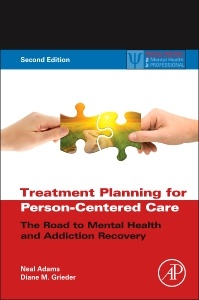Description
Treatment Planning for Person-Centered Care (2nd Ed.)
Shared Decision Making for Whole Health
Practical Resources for the Mental Health Professional Series
Authors: Adams Neal, Grieder Diane M.
Language: English
Subject for Treatment Planning for Person-Centered Care:
Keywords
DSM-5TM; DSM-5TM integrated summary; Wagner chronic care model; goals; health and wellness; health care reform; integrated care (treatment); integrated summary; interventions; medical necessity; objectives; outcomes; peer support; person-centered plan(ning); person-centeredness; progress notes; reassessment/evaluation; shared decision making; shared-care planning; stage of change; transition/discharge planning; trauma-informed care; whole health
290 p. · 15x22.8 cm · Hardback
Description
/li>Contents
/li>Readership
/li>Biography
/li>Comment
/li>
Treatment Planning for Person-Centered Care, second edition, guides therapists in how to engage clients in building and enacting collaborative treatment plans that result in better outcomes. Suitable as a reference tool and a text for training programs, the book provides practical guidance on how to organize and conduct the recovery plan meeting, prepare and engage individuals in the treatment planning process, help with goal setting, use the plan in daily practice, and evaluate and improve the results. Case examples throughout help clarify information applied in practice, and sample documents illustrate assessment, objective planning, and program evaluation.
Acknowledgments
Foreword
Preface
SECTION I - Land of Opportunity
1 The Healthcare Landscape
SECTION II - Getting Started
2 Assessment
3 Understanding Needs: The Integrated Summary
SECTION III - On the Road
4 Setting Goals
5 Focusing on Change: Identifying Barriers and Specifying Objectives
6 Interventions
SECTION IV - Journey's End: The Destination
7 Evaluating the Process
Epilogue
Diana's Assessment
JR's Assessment
Keisha's Assessment
Roberto's Assessment
Index
Diane Grieder is the owner of AliPar, Inc., a behavioral health consulting firm committed to improving organizational performance, and co-author of Treatment Planning for Person-Centered Care: The Road to Mental Health and Addiction Recovery, a textbook with Elsevier/Academic Press with Neal Adams MD, published in late 2004. She is also a co-author with Dr Adams of a chapter in the Handbook of Community Psychiatry, “Collaborative Person-Centered Planning, published by Springer in 2012.
Diane is also a consultant with the National Council of Behavioral Healthcare and with NASMHPD. AliPar, Inc. was awarded a SAMHSA small business grant to create four person and family centered training guides to be disseminated by SAMHSA. Her work with SAMHSA also includes planning and presenting at SAMHSA’s Consensus Conference on Person and Family Centered Planning. AliPar provides training and technical assistance across the country to whole state systems, psychiatric hospitals, and community behavioral health programs. Diane is also a regular presenter at national conferences such as USPRA, NCCBH, CARF, NYAPRS, and NASMHPD. In May 2012 she presented with Dr Adams at the 5th Geneva Conference on Person-Centered Medicine in Switzerland.
Diane has an extensive background working as a QI Director and Clinical Director/Program Manager in the behavioral health field at local outpatient and residential community settings (both private for profit and non-profit) in New Jersey and Virginia She was an accreditation surveyor with CARF for more than 17 years, and has conducted at least 100 accreditation surveys, served on several CARF National Advisory Committees to develop and revise standards, and provided training at four CARF International Conferences on Behavioral Health. From January 1999 to May 2000, she was selected by CARF to assume the role of project director for the CSAT Methadone/LAAM Accreditation Demonstration Project.
Areas of Expertise: performs clinica
- Presents evidence basis that person-centered care works
- Suggests practical implementation advice
- Case studies translate principles into practice
- Addresses entire treatment process from assessment & treatment to outcome evaluation
- Assists in building the skills necessary to provide quality, person-centered, culturally competent care in a changing service delivery system
- Utilizes sample documents, showing examples of how to write a plan, etc.
- Helps you to improve the quality of services and outcomes, while maintain optimum reimbursement

